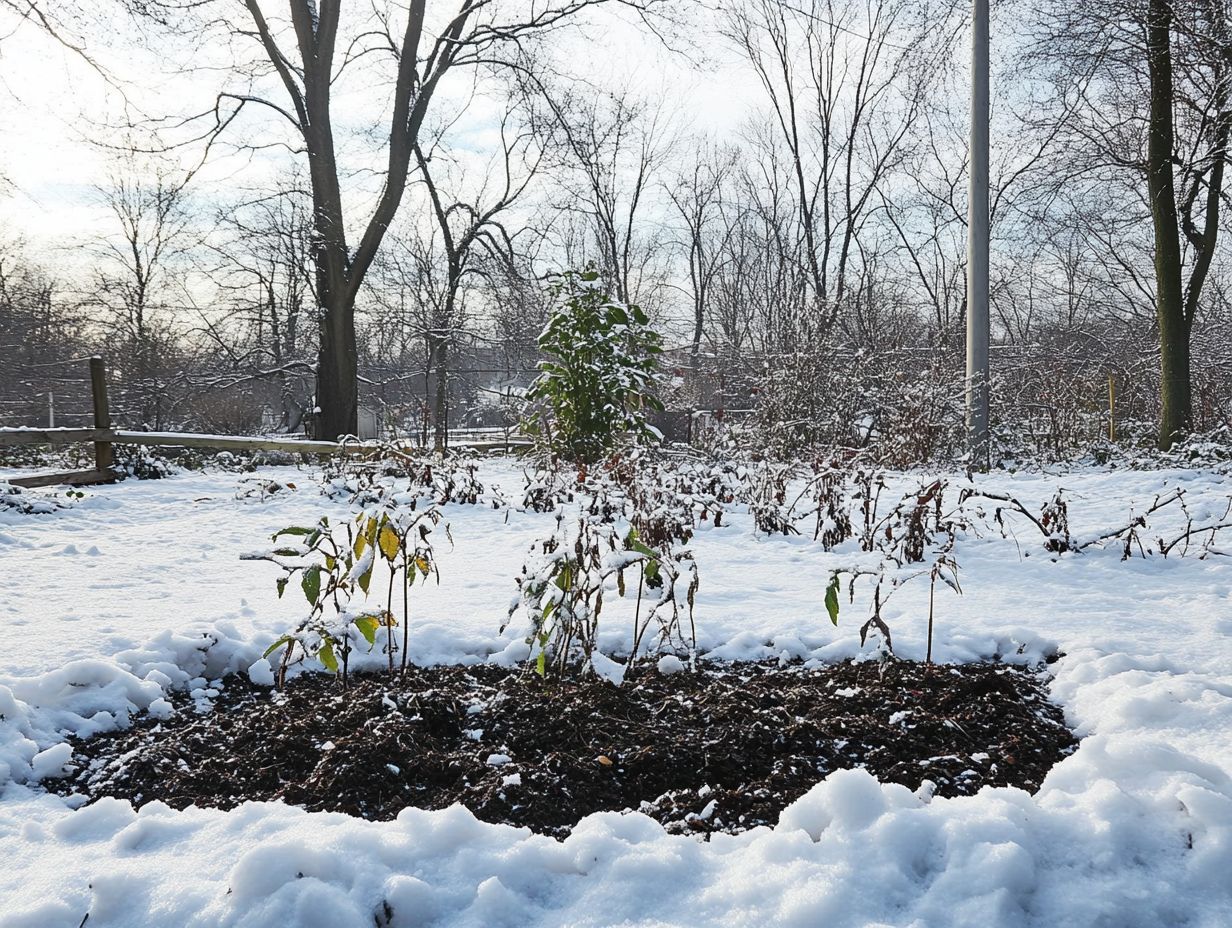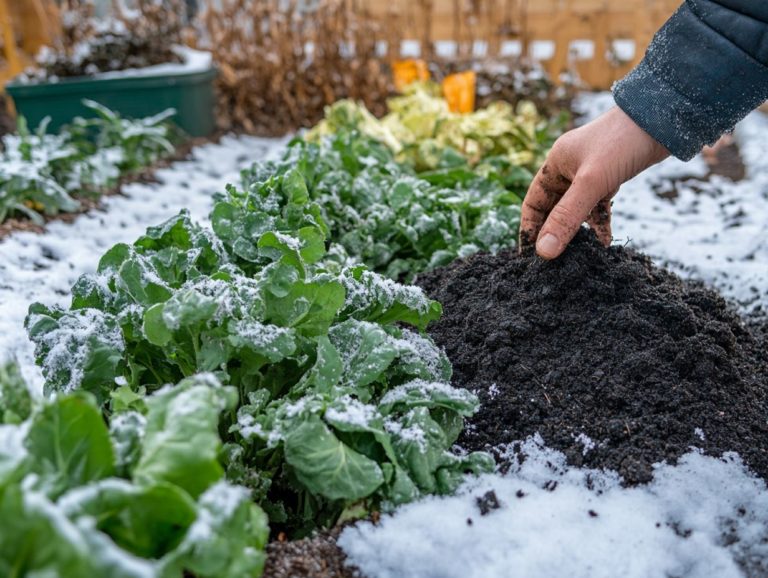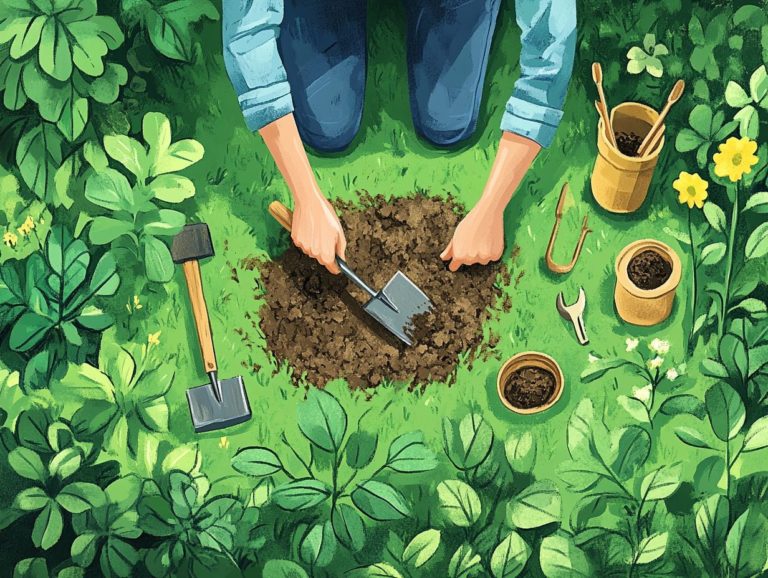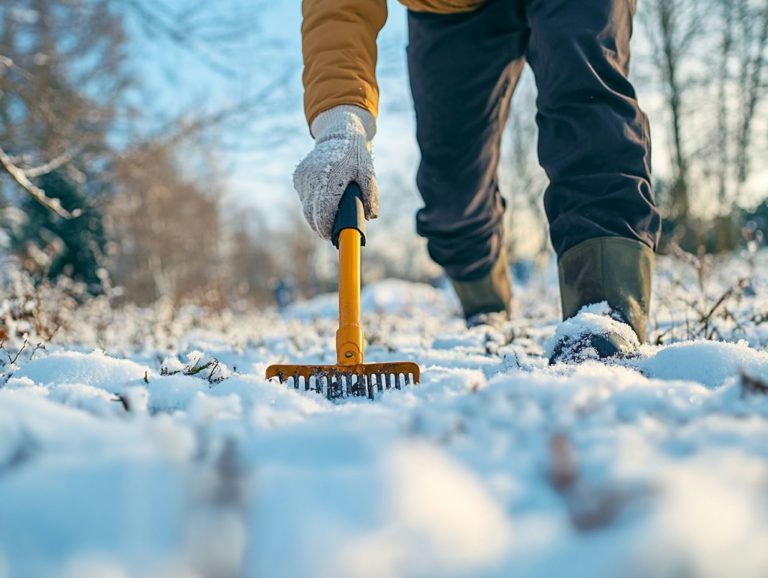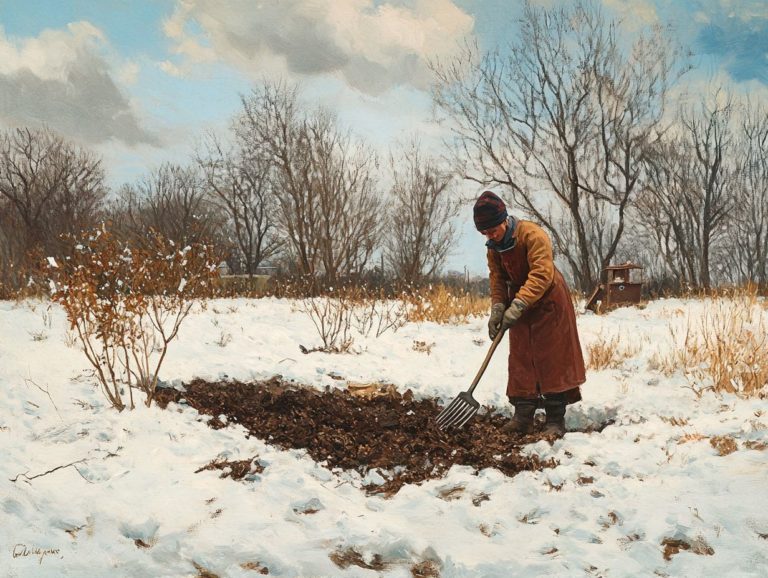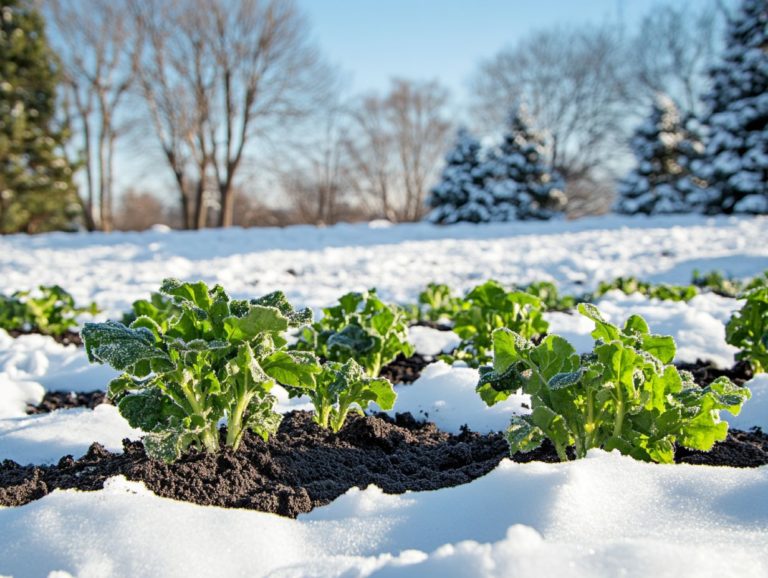Natural Fertilizers for Cold-Climate Gardens
Gardeners in cold climates face unique challenges. Choosing the right fertilizers can truly elevate your gardening experience!
Natural fertilizers enrich the soil and promote healthier plant growth. They are an exceptional choice for those tending to gardens in cooler regions.
This article explores the many benefits of natural fertilizers. We ll highlight various types that thrive in cold climates and offer practical application tips.
From compost to seaweed and more, learn how to unlock your garden’s full potential while nurturing the environment.
Transform your gardening journey with these organic options!
Contents
- Key Takeaways:
- 1. Benefits of Using Natural Fertilizers
- 2. Types of Natural Fertilizers for Cold-Climate Gardens
- 3. Compost
- 4. Manure
- 5. Seaweed
- 6. Bone Meal
- 7. Fish Emulsion
- 8. Blood Meal
- 9. Green Manure
- 10. Worm Castings
- 11. How to Use Natural Fertilizers in Cold-Climate Gardens
- 12. Tips for Maximizing the Benefits of Natural Fertilizers
- 13. Common Mistakes to Avoid When Using Natural Fertilizers
- 14. The Importance of Soil Testing
- Frequently Asked Questions
- Discover the Power of Natural Fertilizers in Cold-Climate Gardens!
- What are Some Examples of Natural Fertilizers Suitable for Cold-Climate Gardens?
- How Do I Apply Natural Fertilizers to My Cold-Climate Garden?
- Can I Use Natural Fertilizers in Combination with Synthetic Fertilizers?
- Are Natural Fertilizers Like Compost and Chicken Manure Safe for Cold-Climate Gardens?
- How Often Should I Apply Natural Fertilizers to My Cold-Climate Garden?
Key Takeaways:
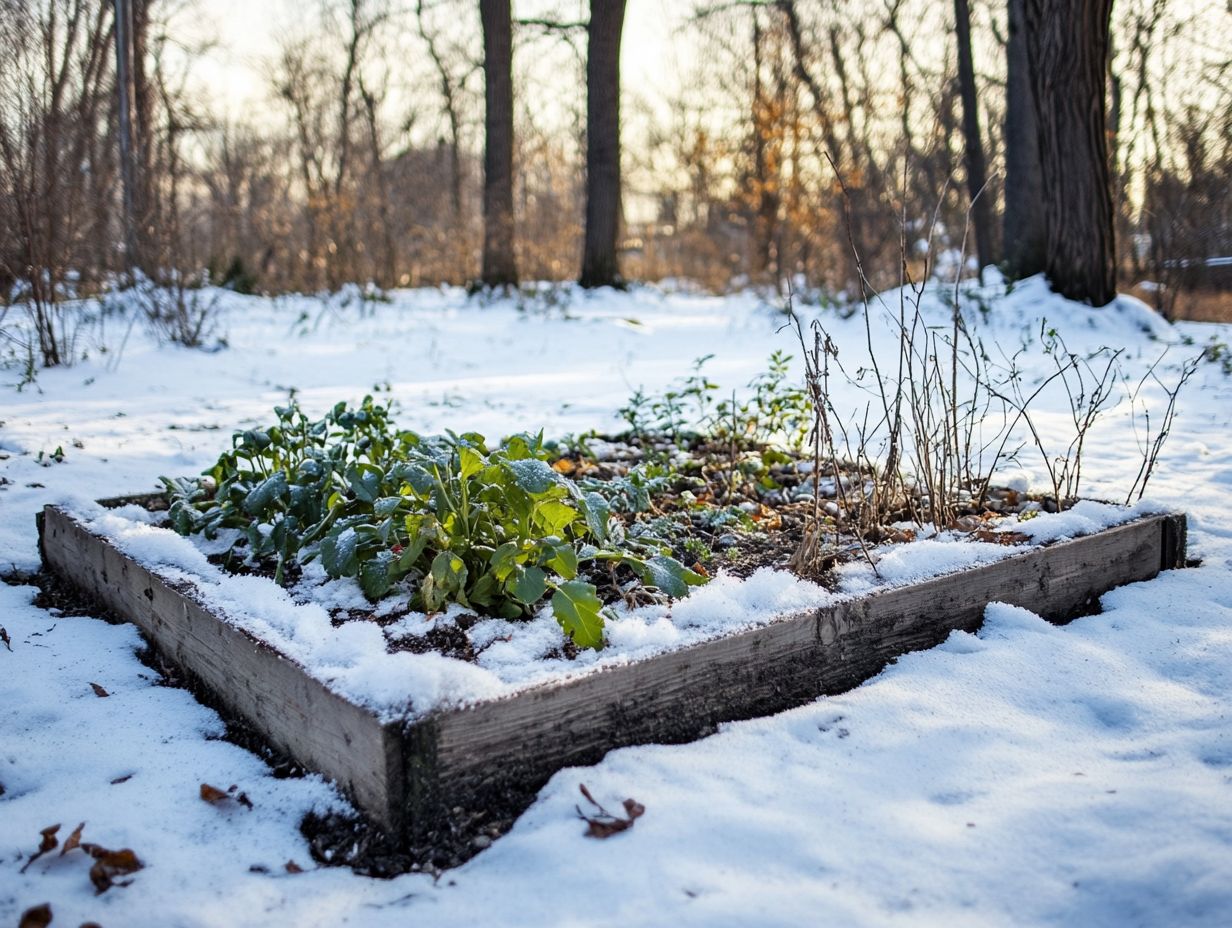
- Natural fertilizers boost soil health and protect the environment.
- Top natural fertilizers for cold climates include compost, manure, seaweed, and bone meal.
- To maximize their benefits, apply them correctly and test your soil regularly.
1. Benefits of Using Natural Fertilizers
Natural fertilizers come from organic materials. They offer many benefits for gardeners and agricultural enthusiasts who want to enhance soil health.
By leveraging organic fertilizers like compost, chicken manure, and fish emulsion, you can stimulate microbial activity and improve nutrient delivery. This nurtures a healthy soil ecosystem that benefits cold-hardy vegetables such as Brussels sprouts, collards, and spinach. Additionally, understanding the benefits of using compost in cold climates can further enhance your gardening practices. By using these methods, you can actively protect our environment!
Incorporating natural fertilizers improves soil structure. This allows for better water retention and drainage critical elements for robust root development.
These fertilizers enhance microbial activity, playing a crucial role in decomposing organic matter and releasing vital nutrients over time. You’ll increase nutrient availability, making essential elements like nitrogen and phosphorus easily accessible for your plants.
The long-term benefits of employing natural fertilizers stretch far beyond immediate productivity. They foster soil resilience, reduce the need for chemical inputs, and support a balanced ecosystem that encourages beneficial organisms all while cultivating a thriving gardening landscape.
2. Types of Natural Fertilizers for Cold-Climate Gardens
Cold-climate gardens truly flourish when you enrich them with natural fertilizers tailored to their unique environments. For more information on this, check out what fertilizers work best in cold-climate gardens, ensuring optimal growth for your cold-hardy vegetables.
By embracing a variety of organic fertilizers such as compost, cover crops, seaweed, bone meal, fish emulsion, and blood meal you significantly enhance soil biology and nutrient delivery.
These fertilizers do more than elevate nutrient levels; they also improve soil structure. This enables better water retention and aeration critical factors during harsh winters.
Think of compost as a powerhouse of nutrients while also nurturing beneficial microorganisms. This makes it perfect for cultivating a resilient soil ecosystem.
Cover crops, like clover or rye, prevent erosion and fix nitrogen in the soil, minimizing the need for synthetic fertilizers. Seaweed extracts offer trace minerals and bolster your plants’ stress tolerance.
Bone meal contributes phosphorus for robust root development. Fish emulsion provides a quick nutrient boost, ideal for a mid-season revitalization, and blood meal serves as a potent nitrogen source to support vigorous growth.
Each type of fertilizer plays a unique role, creating a balanced strategy for nurturing flourishing, sustainable gardens. For those gardening in colder areas, consider exploring the top 10 soil amendments for cold-weather gardens.
3. Compost
Ready to transform your garden? Let’s dive into the wonders of compost! Compost stands as a cornerstone of organic gardening, offering a rich source of nutrients while enhancing soil biology to cultivate a vibrant garden ecosystem. By breaking down natural materials, compost enriches your soil with beneficial microbes, improves moisture retention, and boosts nutrient delivery. This makes it an invaluable organic fertilizer for maintaining soil health.
The composting process involves decomposing various organic materials, such as kitchen scraps, yard waste, and even paper products. The result? A dark, crumbly substance brimming with essential nutrients. You can use a range of green materials, like vegetable peels and grass clippings, along with brown materials, such as dried leaves and cardboard, to achieve a balanced compost mix.
This nutrient-rich compost is a game-changer for gardens in colder climates! It helps build healthier soil structures, improves drainage, and provides insulation for plant roots during harsh winters, ultimately promoting robust plant growth and efficient nutrient cycling. Additionally, incorporating perennial herbs for cold-climate gardens can further enhance your garden’s resilience.
4. Manure
Manure, especially chicken manure, is an exceptional organic fertilizer that brims with nutrients vital for enhancing soil health and fertility. This natural nitrogen powerhouse enriches the soil and boosts microbe activity, cultivating a thriving soil ecosystem that’s essential for growing your favorite cold-hardy vegetables.
You can also use other types of manure to elevate your gardening game, each offering its unique nutrient profile. For example, cow manure is celebrated for its high organic matter content, which significantly improves soil structure. Horse manure delivers a balanced mix of nitrogen and potassium.
When applying these manures, take the crucial step of composting them first. This process helps reduce pathogens and odors, ensuring you achieve a balanced nutrient ratio. Using proper application techniques like spreading manure during fallow periods and incorporating it into the soil can effectively mitigate risks such as nutrient runoff, allowing your garden to flourish while protecting the environment.
5. Seaweed
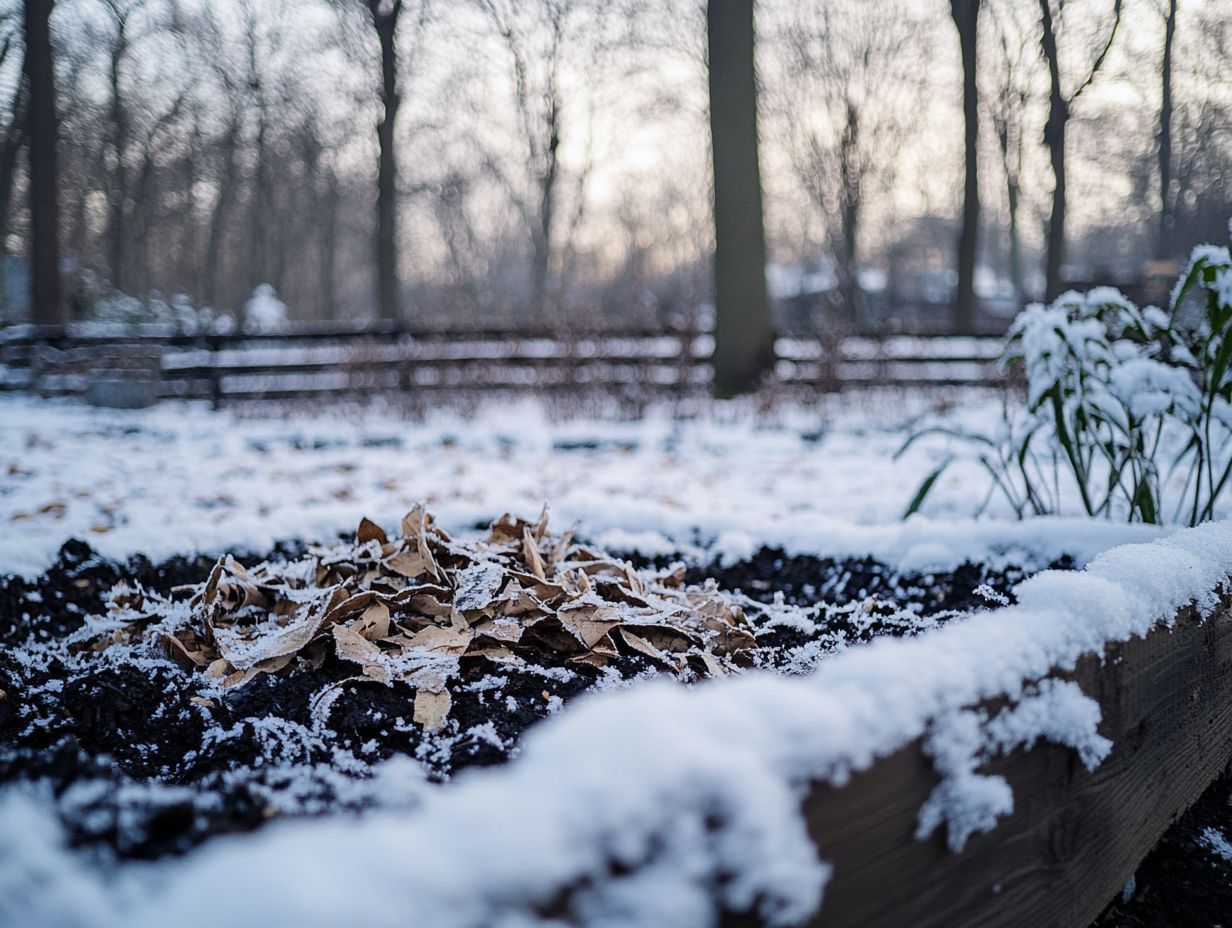
Seaweed is an exceptional organic fertilizer, celebrated for its remarkable ability to enhance soil health and stimulate microbe activity, making it a favorite among discerning gardeners like you! Packed with trace minerals and hormones, seaweed nurtures the growth of beneficial microbes and amplifies natural substances that help plants grow, creating a vibrant garden ecosystem.
You ll find various forms of this natural treasure available, such as dried flakes, liquid extracts, and granular options, each providing unique advantages that are particularly beneficial for cold-climate gardens. Ready to boost your garden? Just mix the flakes into the soil or dilute the liquid extract for foliar sprays. This invigorates your plants while fortifying their resilience against harsh weather conditions.
The benefits extend beyond individual plants, enriching overall soil biology by promoting nutrient retention and improving moisture absorption. This leads to healthier, more productive gardens, even in challenging climates. Embracing seaweed in your gardening routine might just be the upgrade your garden has been waiting for!
6. Bone Meal
Bone meal is an exceptionally potent organic fertilizer, renowned for its high phosphorus content an essential element for root development and flowering, especially in cold-hardy vegetables. By enriching your soil with this natural source of phosphorus, you can significantly enhance its health and foster robust growth in your cool-season gardens.
When you combine bone meal with other organic fertilizers, like compost or fish emulsion, the benefits multiply. This dynamic duo provides a well-rounded nutrient profile that supports the overall vitality of your plants. Not only does this combination promote vigorous root systems, but it also encourages healthy flowering and fruiting.
Applying bone meal in early spring, when the soil is still cool yet primed for nutrient inputs, is particularly effective. It integrates seamlessly with various organic amendments, ensuring your plants receive a balanced array of essential nutrients. This synergistic approach cultivates sustainable gardening practices, leading to richer harvests and healthier gardens.
7. Fish Emulsion
Fish emulsion is your go-to organic fertilizer, rich in essential nutrients, especially nitrogen. This liquid gold enhances nutrient delivery, making it a top choice for gardeners. It supports robust growth in cold-hardy vegetables.
Extracted from fish or fish by-products, fish emulsion undergoes a careful hydrolysis process, a method that breaks down fish into liquid nutrients. This transforms the fish into a nutrient-dense liquid.
Its wealth of amino acids and trace minerals makes it perfectly suited for a diverse range of plants, particularly those thriving in colder climates, like kale, broccoli, and root vegetables. Beyond promoting stronger root development, it enriches the soil microbiome, creating a balanced ecosystem that bolsters plant resilience against the rigors of harsh weather.
8. Blood Meal
Blood meal serves as a potent organic fertilizer, cherished for its impressive nitrogen content. This makes it a superb option for accelerating the growth of cold-hardy vegetables. As a natural nitrogen source, blood meal enhances soil health and stimulates microbial activity.
To maximize the benefits of blood meal in your garden, pay close attention to timing and application rates. A general guideline suggests using one to two pounds per 100 square feet, but it’s wise to conduct a soil test first to customize the dosage according to your specific nutrient requirements.
Incorporating blood meal into the soil at planting time delivers an immediate nutrient boost, improving the balance of soil nutrients particularly in areas where nitrogen may be lacking. This approach helps your plants establish a robust root system swiftly and encourages healthier foliage.
9. Green Manure
Green manure, often cultivated as cover crops, stands out as a remarkable organic fertilizer. It enriches soil health by infusing it with organic matter and enhancing nutrient delivery. This practice not only improves soil structure but also nurtures a vibrant soil ecosystem.
You have a variety of green manure options at your disposal, including legumes like clover and vetch, as well as grasses like rye and oats, each offering unique advantages. Legumes excel at fixing nitrogen, making it readily available for future crops, while grasses enhance drainage and soil aeration.
This dynamic interplay significantly boosts nutrient cycling, ensuring essential minerals are more accessible for plant uptake.
By incorporating green manure, you actively support beneficial microorganisms, enriching the soil’s biodiversity and resilience. As a result, you’ll find that using green manure curbs weed growth and fosters healthier, more robust plants in the following growing seasons.
10. Worm Castings
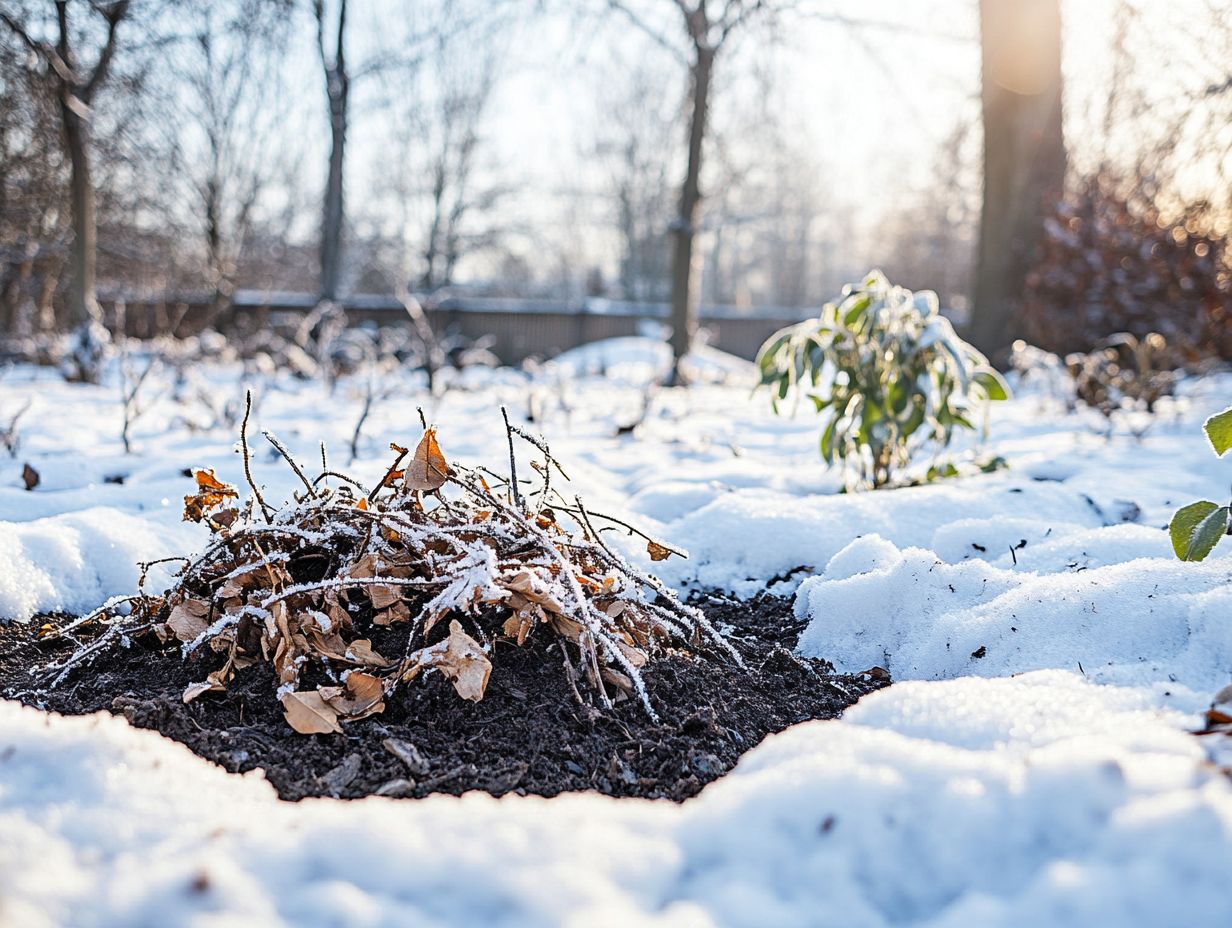
Worm castings are an organic fertilizer you should consider for your garden! They boost soil health and nurture beneficial microbes.
Packed with nutrients, worm castings improve delivery to plants, promoting vigorous growth.
These nutrient-rich droppings come from worms processing organic matter. They are an excellent addition for various soil types, especially in colder climates.
Incorporating worm castings helps maintain moisture and aeration both vital for healthy roots.
These castings also provide micronutrients and enzymes. They not only help plants withstand stress but also enhance germination rates.
If you’re striving to succeed in tough conditions, worm castings are your essential ally for a productive garden!
11. How to Use Natural Fertilizers in Cold-Climate Gardens
Using natural fertilizers in your cold-climate garden requires a keen understanding of their unique properties and interactions with soil health. From compost to fish emulsion, knowing when and how to apply these organic fertilizers can lead to robust growth in your cold-hardy vegetables. Consider exploring using natural fertilizers in winter while embracing sustainable gardening practices.
Timing is everything. Certain fertilizers work best when applied during specific growth phases. For instance, apply compost in early spring to enrich the soil as your plants start to grow. A late-season application of fish emulsion can enhance nutrient uptake as your crops reach maturity.
Combine slow-release options like bone meal with faster-acting solutions such as liquid kelp to create a balanced nutrient profile that caters to your plants’ varying demands throughout the season. Understanding these combinations can boost soil fertility and plant resilience, especially in harsher climates.
12. Tips for Maximizing the Benefits of Natural Fertilizers
Maximizing the benefits of natural fertilizers requires a strategic approach that enhances soil health and supports microbial activity. Implement specific techniques to harness the full potential of organic fertilizers and create a thriving garden ecosystem.
Apply fertilizers during your plants’ active growth phase to ensure nutrients are readily absorbed. Maintain consistent moisture levels in the soil to boost nutrient availability and microbial efficiency.
Embrace crop rotation to prevent nutrient depletion and enhance soil structure and fertility. This allows different plants to thrive based on their unique nutrient needs and growing conditions. Integrate these actionable tips to cultivate a more resilient and productive garden that flourishes season after season.
13. Common Mistakes to Avoid When Using Natural Fertilizers
Natural fertilizers offer many benefits, but it s crucial to sidestep common mistakes that could harm soil health and nutrient delivery. Understanding these pitfalls enhances the effectiveness of organic fertilizers.
Recognize that overindulging in organic matter, like compost or manure, can create nutrient imbalances that may harm your delicate plants. Conduct regular soil tests to gain insights into pH levels and nutrient deficiencies crucial for your garden s success.
Maintain balance and tailor your fertilization to meet specific soil needs. This creates a harmonious environment that encourages vigorous plant growth and fosters healthier ecosystems, resulting in a more vibrant garden.
14. The Importance of Soil Testing
Soil testing is essential for gardeners aiming to boost soil health and maximize the effectiveness of natural fertilizers. Understand the specific nutrients in the soil and pH (the acidity or alkalinity) to make informed decisions about which organic fertilizers to apply and in what amounts.
This process involves taking samples from different areas of your garden and sending them to a laboratory for analysis. The results provide valuable insights into key nutrient levels such as nitrogen, phosphorus, and potassium and indicators of soil acidity or alkalinity.
Understanding these findings helps you quickly spot any nutrient gaps or excesses, allowing for precise amendments. For example, if your soil is lacking potassium, choose a natural fertilizer rich in this element to boost your plants’ vigor.
Thus, understanding these results simplifies your fertilization strategy and supports sustainable gardening practices, allowing you to cultivate a thriving garden.
Frequently Asked Questions
Discover the Power of Natural Fertilizers in Cold-Climate Gardens!
Natural fertilizers are game-changers for your garden! They are organic materials, such as compost or animal manure, that provide essential nutrients for plant growth. These fertilizers nourish plants and improve soil health while helping plants withstand harsh weather conditions.
What are Some Examples of Natural Fertilizers Suitable for Cold-Climate Gardens?
Some examples of natural fertilizers for cold-climate gardens include:
- Seaweed
- Bone meal
- Fish emulsion
- Blood meal (a high-nitrogen fertilizer made from dried animal blood)
These fertilizers are rich in nutrients and can help plants thrive in colder temperatures.
How Do I Apply Natural Fertilizers to My Cold-Climate Garden?
You can apply natural fertilizers by mixing them into the soil before planting or by top-dressing around existing plants. It is important to follow the recommended application rates on the product label. After application, water the garden to help the fertilizer reach the plant roots.
Can I Use Natural Fertilizers in Combination with Synthetic Fertilizers?
Yes! Natural and synthetic fertilizers can be used together in a cold-climate garden with cold-hardy vegetables like Brussels sprouts, collards, and spinach, especially in a cool-season garden. For more insights, check out what to know about soil fertility in cold climates. Be mindful of the amounts and types of fertilizers used to avoid over-fertilization. Alternating between natural and synthetic fertilizers can help maintain soil health.
Are Natural Fertilizers Like Compost and Chicken Manure Safe for Cold-Climate Gardens?
Yes, natural fertilizers such as fish emulsion and compost tea are generally safe for use in cold-climate gardens. Always read and follow the instructions on the product label for proper handling and application. This maintains soil health and promotes microbial activity. Additionally, using soil amendments effective for cold climates can enhance your garden’s performance. Let the fertilizer decompose before harvesting any fruits or vegetables to avoid potential contamination.
How Often Should I Apply Natural Fertilizers to My Cold-Climate Garden?
The frequency of applying natural fertilizers can vary depending on the type of fertilizer and the plants’ needs. Follow the instructions on the product label or conduct a soil test to find the best application schedule for your specific garden, considering soil temperature and moisture levels.

